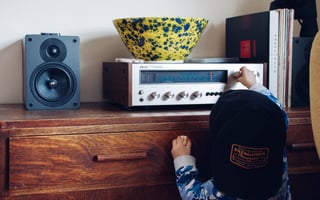Radio might lack the glamour of TV.
Are radio interviews part of your comms and PR strategy?
The latest audience figures suggest they should be because more people are listening to radio than ever before.
According to RAJAR – the organisation measuring UK radio audiences - 50 million adults tune into the radio each week. That works out as 89 per cent of the UK adult population.
And the average listener tunes into more than 20 hours of live radio a week.
77% of the population tune into radio via a digital platform each week. On average a listener tunes in for over 20 hours a week #RAJAR pic.twitter.com/xs7al9tsH4
— RAJAR Ltd (@RAJARLtd) May 16, 2024
Its figures for the first quarter of 2024 also show the way people listen to the radio is changing – 30 per cent of adults now listen to the radio on a smartphone or tablet at least once a month.
Online listening has overtaken analogue FM and AM platforms.
Delving further into the figures, there is a growing demand for commercial radio – it set a new record audience reach of 39.7 million.
Meanwhile, BBC local radio, where local content has been cut back, has seen a 10 per cent decline in its weekly reach year-on-year. Its weekly reach now stands at 4.8 million people.
What about the flagship news programmes?
Well, Radio 4’s Today programme has 5.6 million listeners a week. Nick Ferrari’s LBC breakfast show has 1.4 million weekly listeners. For Radio 5 Live’s breakfast programme, the figure is more than 1.2 million people.
The statistics also show that 33 per cent of adults listen to podcasts at least once a month, again highlighting the growing importance of the format – something we can prepare your spokespeople for and help you create your own one.
So, what does all this mean for you?
As we always stress during our media training courses, radio presents a brilliant opportunity to reach a large audience. And that audience is growing.
But how can you and your spokespeople make the most of this opportunity to reach a mass audience?
Well, here are some expert tips and advice from our training courses.
Start strongly
Radio interviews are surprisingly short – the average radio interview is about two and a half minutes long.
By comparison, a TV interview will typically be closer to five minutes.
So, spokespeople don’t have much time to play with.
And they are talking to an audience that tends to be multi-tasking. People typically listen to the radio while doing something else, like driving, working or cooking. According to RAJAR, 58 per cent of people listen to the radio while driving and 19 per cent while working.
So, you need to grab their attention by ensuring you get to your message at the start. Don’t wait for the ideal question to come along.
Ditch the pleasantries
To grab attention, avoid starting by saying something like “Thanks for having me”, or “Thanks for having me on”.
We get it - it’s an instinctive reaction.
But it is also dull. And the chances are listeners will have already heard every other spokesperson begin in the same fashion.
Additionally, if it follows on from a challenging opening question, it sounds weak and could be viewed as an attempt to avoid the question.
As we stress during our media training courses, keep the pleasantries to a simple ‘Hello’ or ‘Good morning’.
Bring the energy
Listeners are likely to drop out if you sound flat and monotone.
You must bring energy to your interview and show you are passionate and enthusiastic about your subject. Try to match the energy levels of the journalist carrying out the interview.
Be yourself (and tell stories)
A good radio interview is a conversation.
Stick to the language you would use if you were talking to a friend in a pub or café.
People often fall into the trap of trying to be someone else and sound rehearsed and robotic. And the interview is stripped of any personality.
Similarly, share personal stories and anecdotes to bring your interview to life and make what you say resonate. Radio is all about stories, and people are fascinated by those about other people.
Repeat
Don’t be afraid to repeat your message.
People drop in and out of radio programmes. Some will switch on in the middle of your interview.
So, repeat your message several times to avoid it being missed.
But use different words so you don’t sound repetitive and robotic. And avoid saying, “Our message is”.
Don’t ramble
I was listening to a radio interview on the way back from a football match recently and was struck by how long the answers were. It was hard to follow what was being said.
That is a risk for spokespeople. And when it happens, they are not making the most of the opportunity a radio interview presents.
Journalists also tend to interrupt long answers, which can become a distraction.
And lengthy answers during a pre-recorded interview could also be harshly edited.
How long is too long?
Try to avoid going beyond the 30-second mark. But don’t go too far the other way.
Short answers make spokespeople appear defensive, leading to more questions and control of the interview being surrendered.
Go live
Talking of live and pre-recorded interviews, encourage your spokespeople to opt for live interviews if they are given the choice.
We know that can feel daunting and that pre-recorded interviews seem safer.
But we often find live interviews improve the performance of spokespeople. The adrenaline kicks in, and they raise their game, knowing they only have one attempt to get their message across.
And it can help bring more energy and enthusiasm to the conversation.
Live interviews may be shorter than pre-recorded ones, but they usually result in more air time. And, as a live interview can’t be edited before it goes out, you have complete control of what the audience hears.
Camera
One of the big changes in radio interviews in recent years is that many of them now take place in front of cameras.
Plenty of radio stations make videos from their interviews, including remote ones, and use the footage on social media channels.
"I think tomorrow will be an earthquake."
— LBC (@LBC) May 19, 2024
As Jeremy Hunt vows to stand by his pledge on infected blood compensation payouts, @HaemophiliaScot's Bill Wright stresses to @Matthew_Wright that 'this is not about money, it's about thousands of people dying'. pic.twitter.com/rTAtTgH4jqAnd the footage can be widely shared and even be used on TV news programmes.
So, be prepared to be on camera.
Preparation
And that leads us nicely to preparation.
As ever, preparation is the cornerstone of media interview success.
Ensure you know the message you want to get across and have anticipated the tricky questions and wider issues you may get asked about.
You also need to know who you are talking to.
Some stations have big personality presenters who speak their minds, and it can be hard for even highly experienced spokespeople to impose themselves on the interview and take control.
And there is a big difference between appearing on the breakfast show of LBC or Talk Radio and speaking on your regional BBC station.
You can be sure these presenters and their producers are doing their research on you, so make sure you know about them.
Want one more?
Always encourage your spokespeople to listen back to their radio interviews and consider what went well and what they could do differently next time.
It feels awkward, and no one likes listening back to themselves.
But it is a great way to continue to learn and develop.
The importance of media training featuring radio interviews
This isn’t an exhaustive list of radio interview tips.
There is much more expertise and knowledge to share.
The best way to prepare for radio interviews and make the most of this booming platform is through media training with expert tutors who know what radio presenters and their audiences want.
And there is nothing like time in our studios to demystify the alien radio environment and ease the nerves.
Media First are media and communications training specialists with over 35 years of experience. We have a team of trainers, each with decades of experience working as journalists, presenters, communications coaches and media trainers.
Click here to find out more about our media training courses.
Subscribe here to be among the first to receive our blogs.




